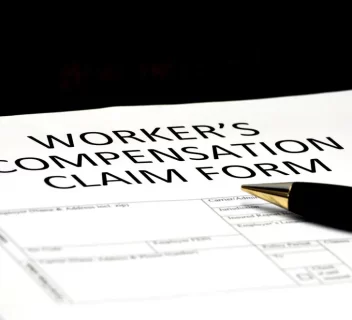Can You Collect Workers’ Comp After Being Fired? Here’s What You Should Know
Being injured at work can turn your life upside down. Workers’ compensation is designed to help employees recover from work-related injuries by covering medical bills, lost wages, and other expenses. However, what happens if you lose your job after an injury? A common question in these situations is, “Can you collect workers’ comp after being fired?”
The answer depends on several factors, including when the injury occurred, the reason for termination, and your employer’s workers’ compensation policy. This guide explains what you need to know about collecting workers’ compensation benefits after being fired and how to get the legal support you may need.
Under What Circumstances Are You Entitled to Workers’ Comp Benefits?
Workers’ compensation benefits are available to employees who are injured or become ill due to their jobs. These benefits provide financial support to help employees recover without the burden of out-of-pocket expenses. Meeting deadlines is crucial when filing workers’ compensation claims to ensure you receive the benefits you are entitled to. To qualify for workers’ compensation, you typically must meet the following criteria:
Be an Employee
Workers’ compensation generally applies to employees, not independent contractors or freelancers.
The Injury or Illness Must Be Work-Related
The injury must occur during the course of employment. This includes injuries sustained on the job site, while operating company equipment, or even during work-related travel.
The Claim Must Be Filed Within the Legal Deadline
Each state has specific deadlines for reporting injuries and filing claims. Failure to meet these deadlines can result in denied benefits.
The Employer Must Have Workers’ Comp Insurance
Most states require employers to carry workers’ compensation insurance. However, small businesses or certain industries may be exempt.
By meeting these conditions, an employee is generally entitled to workers’ compensation benefits, regardless of fault. But what happens if the worker is fired after an injury? Claims are managed by the employer’s insurance company, ensuring benefits are provided even after termination.
Can Someone Receive Workers’ Comp Benefits After Being Fired?
The short answer is yes—a worker can collect workers’ compensation after being fired in many cases. Workers’ compensation is based on your injury, not your current employment status. As long as the injury occurred while you were employed and performing job-related duties, your benefits may not be affected, depending on the circumstances. Factors such as the legality of the termination and medical restrictions play a crucial role in determining eligibility. Additionally, navigating the complexities of workers’ compensation claims can be challenging, so seeking legal assistance is often recommended.
Key Scenarios:
1. Injury Before Termination
If you were injured while employed and subsequently fired, your eligibility for a workers compensation claim remains intact. Termination does not negate your right to compensation for a work-related injury.
2. Injury After Termination
If your injury occurred after you were fired, you are not eligible for workers’ compensation since the injury is not related to your employment.
3. Retaliation for Filing a Claim
Firing an employee in retaliation for filing workers’ compensation claims is illegal in most states. If you suspect retaliation, you may have grounds for additional legal action.
To protect your benefits, it’s crucial to file a claim as soon as possible after the injury. Even if you are terminated shortly after the injury, the filing date will prove that your injury was work-related.
Additional Considerations
- At-Will Employment: While most U.S. employment is “at-will,” meaning employers can terminate employees for any lawful reason, they cannot do so for illegal reasons like retaliation or discrimination.
- Medical Benefits and Wage Loss: If you’re receiving workers’ compensation benefits at the time of termination, you may be able to continue collecting workers’ compensation benefits, including medical treatment and wage loss benefits, as long as you meet your state’s eligibility requirements.
- State Variations: Workers’ compensation laws can vary significantly by state. Specific rights, employer obligations, and procedures may differ depending on where you were employed.
So, can you collect workers’ comp after being fired? Don’t wait to find out—get the answers you need by speaking with an attorney today. You can contact us for a free consultation with a qualified workers’ compensation attorney in our network.
What Sort of a Payout Can You Receive Through Workers’ Comp Benefits?
Workers’ compensation benefits are designed to cover specific types of losses for injured employees. Unlike personal injury claims, workers’ comp does not provide compensation for pain and suffering or punitive damages.
Types of Workers’ Compensation Benefits
- Medical Expenses
Workers’ comp covers the cost of medical treatment related to the injury, including doctor visits, surgeries, medications, and rehabilitation. - Temporary Disability Benefits
If your injury prevents you from working temporarily, you may receive wage replacement benefits, typically two-thirds of your average weekly wages. - Permanent Disability Benefits
If your injury results in lasting impairment, you may qualify for permanent disability payments based on the severity of your condition. - Vocational Rehabilitation
Workers’ comp may cover job training or education if your injury prevents you from returning to your previous role.
Example:
Suppose you are an injured worker operating heavy machinery at work, resulting in a fractured leg. Workers’ comp may cover:
- Medical Bills: Doctor visits, X-rays, and physical therapy.
- Temporary Disability Benefits: Two-thirds of your wages while you recover.
- Vocational Rehabilitation: Training for a desk job if you can no longer perform physical labor.
Keep in mind that workers’ comp benefits have limits. For instance, wage replacement benefits are capped based on state law, and there is no compensation for non-economic damages like emotional distress.
What Are the Advantages and Disadvantages of Workers’ Comp?
Advantages:
- Guaranteed Coverage: Workers’ comp provides benefits regardless of who caused the injury.
- No Need to Prove Negligence: You don’t have to show that your employer was at fault.
- Quick Access to Benefits: Workers’ comp is designed to offer timely medical care and wage replacement benefits. Benefits are typically paid out faster than in personal injury cases.
Disadvantages:
- Limited Compensation: Workers’ comp does not cover pain and suffering or punitive damages.
- Employer Scrutiny: Employers or insurers may challenge claims to minimize payouts, affecting those collecting workers’ compensation benefits.
- Loss of Legal Rights: Accepting workers’ comp benefits generally waives your right to sue your employer for additional damages.
While you generally cannot sue your employer after accepting workers’ comp, you may still have the option to file a lawsuit against a third party whose negligence contributed to your injury (e.g., equipment manufacturers, subcontractors).
The First Step When Dealing with an Accident Is to Seek Medical Assistance
After an accident occurs, the first and most important step is to seek emergency medical treatment, if necessary. Immediate medical attention is crucial not only for your recovery but also to address any underlying issues promptly, which can help prevent future complications. Failure to seek medical treatment (or to follow up with a physician if immediate care is not required) could undermine your claims.
This is because the defendant could argue that your injuries were created by your failure to obtain adequate medical treatment in a timely manner. If that argument is difficult for them to make, they might fall back on a secondary claim: that your damages should be reduced because your injuries were worsened by delays in treatment.
Who Should You Contact First If You Have an Accident at Work?
While you may have been taught to report workplace accidents right away (and you should), the person you should contact first is actually an attorney. Attorneys can assist with incident management by ensuring all necessary steps are taken to report the accident properly and protect your rights.
When you submit a workplace accident report — whether as a formal form, a casual conversation with HR, or through other channels — you may be disclosing sensitive information that could undermine your claims. Your employer is not necessarily your ally in this situation. Even well-meaning employers could use your statements against you later on.
Attorneys are more than just courtroom advocates. They can assist with various responsibilities, from helping you report workplace accidents to managing communications on your behalf. Experienced work injury lawyers act as intermediaries — they can communicate with your employer and help you submit the required accident report. This minimizes potential issues that could arise as you move forward with your claims.
How Much Does a Workers’ Comp Attorney Cost to Hire?
Most workers’ comp attorneys work on a contingency fee basis, meaning you don’t have to pay anything upfront.
Contingency fees are simple: instead of taking an upfront fee, your attorney will provide legal representation in exchange for a percentage cut of whatever compensation they’re able to secure on your behalf. If the attorney does not win your case, you owe them nothing.
Attorney fees in workers’ compensation cases are often regulated by state laws. Some states have caps on the percentage an attorney can charge or require fees to be approved by a workers’ compensation judge or board.
This arrangement makes it accessible for injured workers to obtain legal representation, even if they are facing financial hardships. A skilled attorney can handle negotiations, gather evidence, and represent you in disputes with your employer or their insurance company.
Contact 1-800-THE-LAW2 for a Free Consultation
If you’ve been injured at work, you may be asking yourself, “Can you collect workers’ comp after being fired?” The answer is often yes. However, navigating the claims process can be challenging, particularly if you’ve been terminated.
That’s why it’s crucial to hire a workers’ comp attorney to help you navigate the legal process. For this reason, we encourage you to seek guidance from an experienced workers’ compensation lawyer.
Contact 1-800-THE-LAW2 for a free consultation with a qualified workers’ compensation attorney in our network. During this initial consultation, you’ll have the opportunity to discuss the details of your case and explore your strategic options.
We look forward to assisting you.




